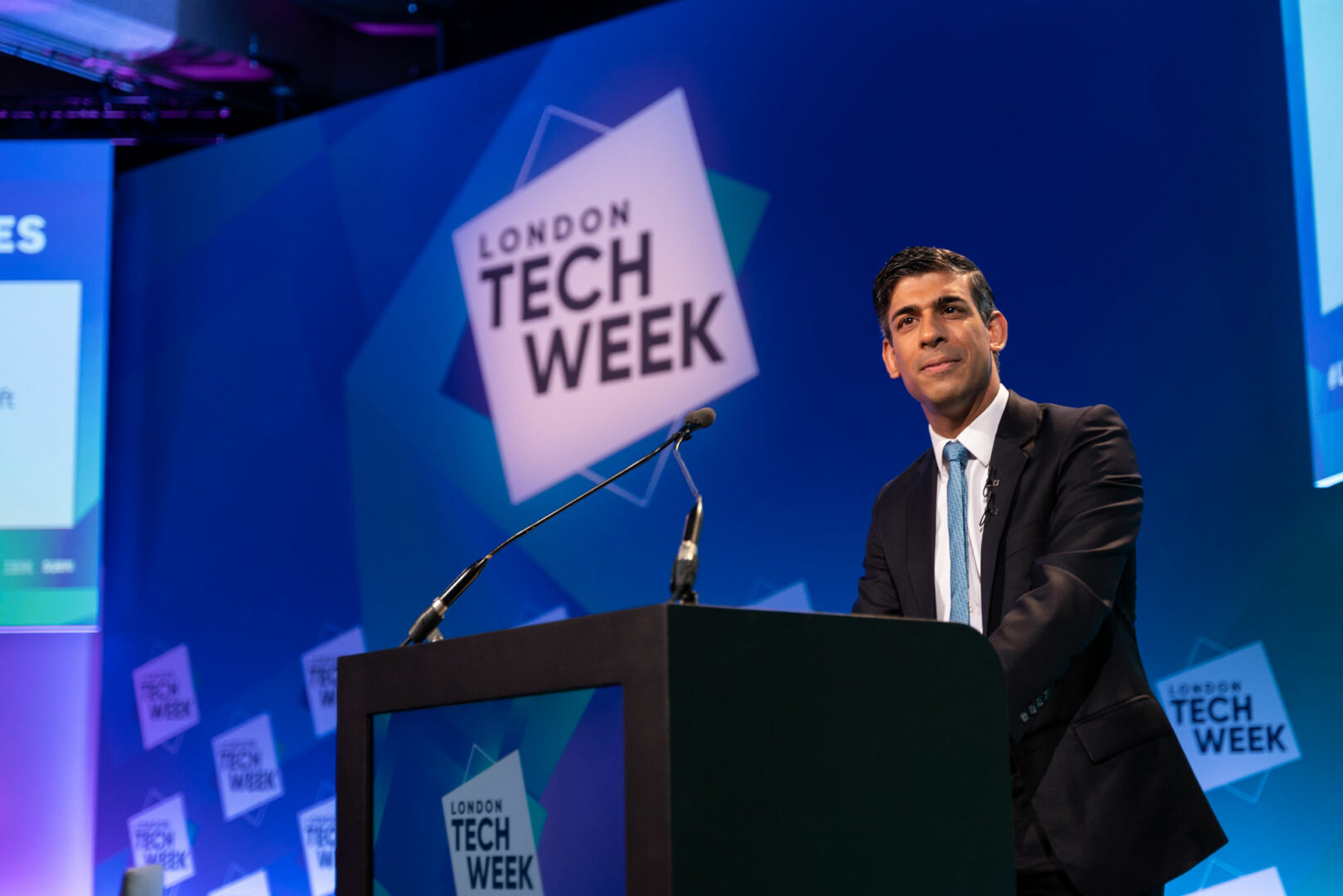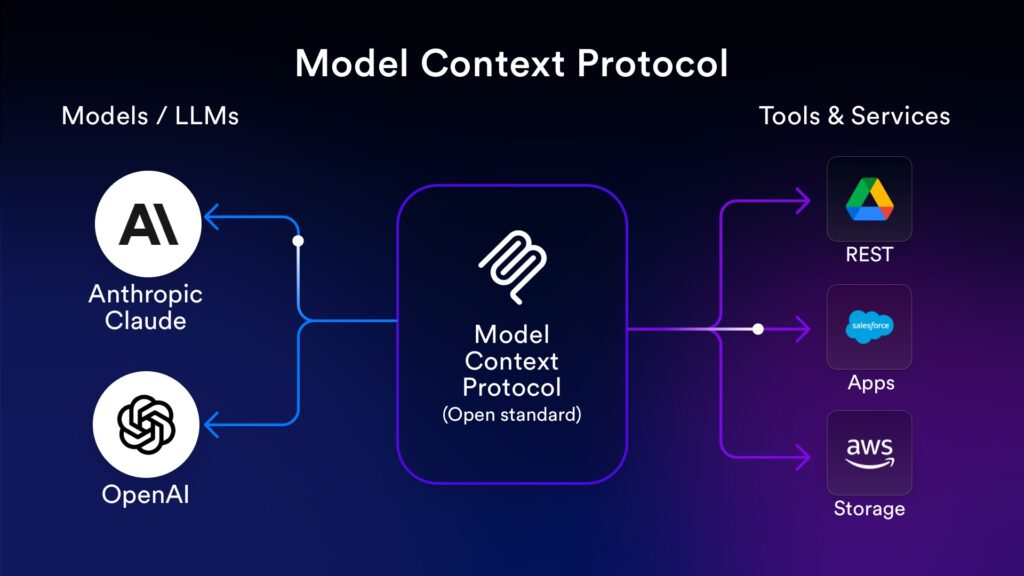Last week saw London Tech Week 2023 roll into town; in what is now the 10th anniversary of the conference, the two words on everyone’s lips, including the Prime Minister’s, were ‘Artificial Intelligence’. (AI)
As always, the Lightflows team were watching with interest, and in this roundup, we reflect on the more AI focussed keynotes from London Tech Week 2023. There genuinely seems to be a buzz in the air about AI and the sense that we’re on the cusp of a new age of innovation. It’s undoubtedly one of the most exciting times we can remember to be involved with technology.
Global Leaders Innovation Summit
With the Global Leaders Innovation Summit at its core, the event united tech influencers in fueling innovative thinking and actions towards a more equitable, resilient, and just world.
The week was enriched with dedicated platforms and initiatives, such as EQL: HER, a global network to advance gender equity in the tech sphere. Notably, the Elevating Founders programme was an inspiring space that encouraged frank discussions around startup journeys and investment experiences while emphasising inclusivity as a key driver of innovation.
The ClimateTech and HealthTech summits, partnerships between Founders Forum and Informa Tech, were standout attractions. The forums spotlighted the role of technology in combating climate change and revolutionising healthcare, establishing sustainability and well-being as priorities for the global tech community.
Also noteworthy was the Founders of the Future competition, which excited young minds across the UK and abroad by challenging them to develop high-impact, sustainable business ideas.
Each initiative and discussion during London Tech Week 2023 demonstrated technology’s capacity to shape the future positively.
UK Prime Minister pledges to make the UK a global tech leader
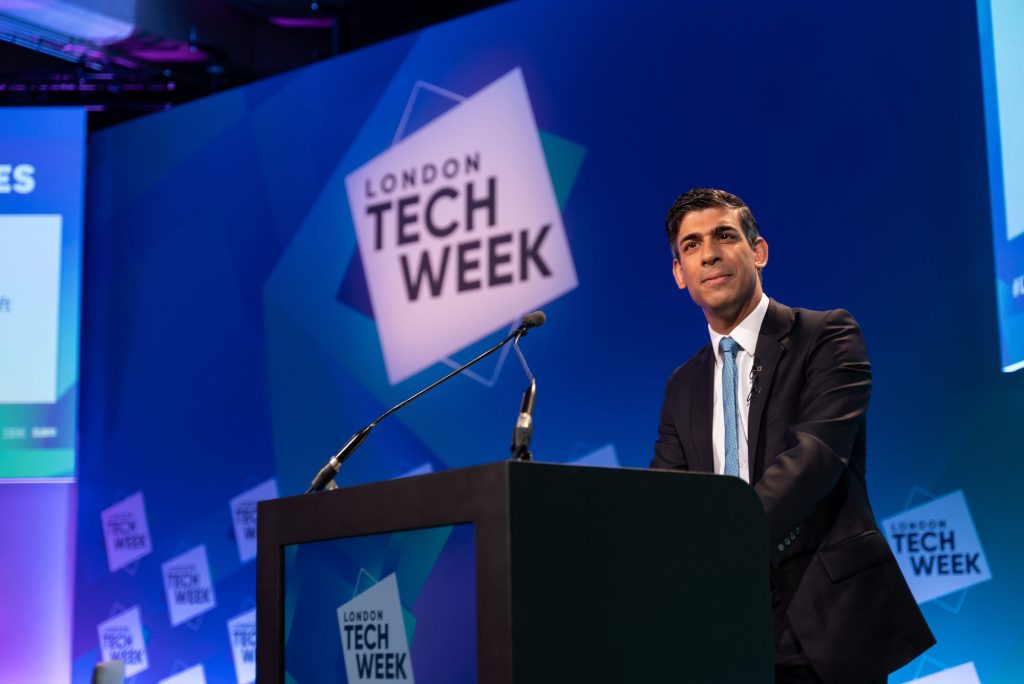
London Tech Week was graced by an inspiring keynote by the UK Prime Minister, packed with clear ambitions for the UK to become the world’s foremost tech capital. The PM’s speech spoke volumes about the nation’s tech aspirations.
Seizing the tech moment
The Prime Minister labelled the UK an “island of innovation,” asserting that the UK should not rest on its laurels. Instead, it should seize the moment and capitalise on current tech trends like AI, quantum computing, synthetic biology, and semiconductors. The goal? Make the UK the best place to start, grow, and invest in tech businesses.
Tech Successes and future goals
The Prime Minister cited the UK’s tech successes, including producing 134 unicorns in the past decade, boasting a higher percentage of STEM graduates than the US, and being a significant player in FinTech, cyber and creative industries. However, he expressed urgency to build on these successes, fuelling the growth of a more robust tech ecosystem.
Government actions drive tech growth
Government initiatives to foster an environment conducive to technological growth include pro-investment tax reforms, increased public R&D investment, and visa system adjustments. A significant announcement was the launch of the HSBC Innovation Banking – a significant development in global tech banking, to be headquartered in the UK.
Focusing on AI
The PM highlighted AI as one of the most significant opportunities in tech, citing the government’s support in doubling AI scholarships and a commitment to cutting-edge AI safety research.
Towards global AI safety
The Prime Minister emphasised AI’s disregard for national borders and underscored the need for global cooperation between nations and labs. The UK plans to host the first-ever global AI safety summit, symbolising its intent to lead the AI safety regulation front.
Harnessing AI for public services
AI’s potential to transform public services was also discussed. With significant investments in computing technology and quantum, the UK government aims to revolutionise public services, from education to healthcare.
Concluding Thoughts
The PM’s keynote paints an ambitious picture of the UK as a future tech powerhouse. As we navigate the 21st century, the initiatives and commitments outlined at the London Tech Week showcase the UK’s readiness to seize the tech moment and drive a prosperous future.
Microsoft Co-Pilots: An AI-driven fourth industrial revolution
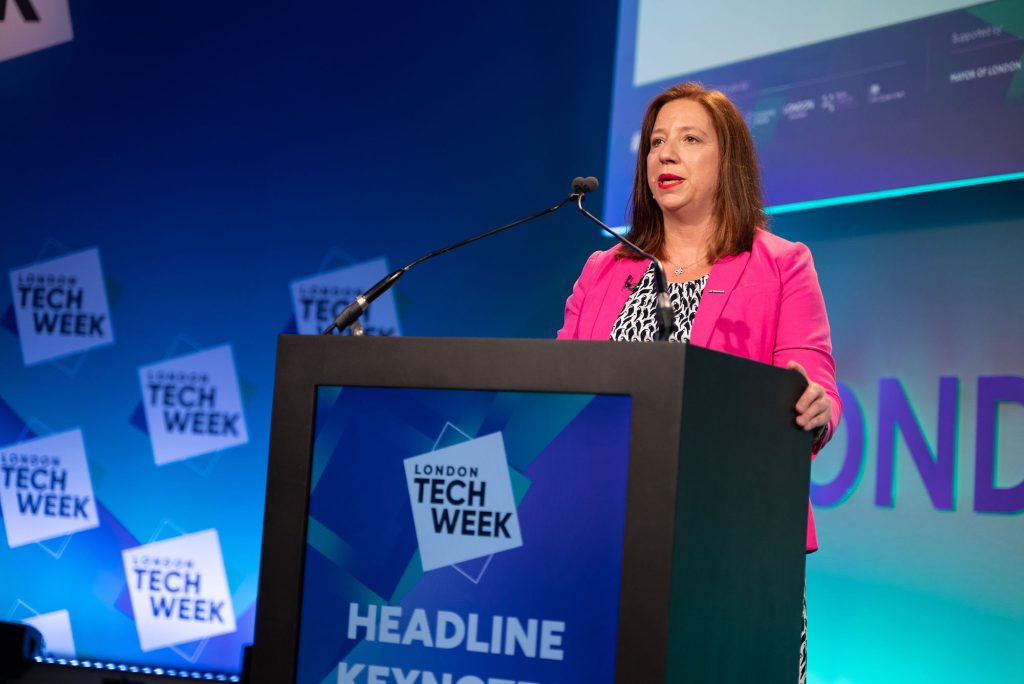
According to Clare Barclay, CEO of Microsoft UK, we stand on the precipice of an unprecedented technological revolution. In a recent address, Barclay reflected on the transformative power of past industrial revolutions and projected the vast potential of artificial intelligence (AI) to ignite the fourth. The technological marvel she calls “AI CoPilots” is not designed to replace human activity but to enhance and amplify our capabilities across various professional fields.
These advanced AI systems aim to redefine the future of work. But, as Barclay rightly highlights, this new technological frontier must also consider the ethical implications of widespread AI implementation. As these technologies shape the world, they must be guided by robust ethical principles. Barclay welcomes the UK government’s initiative to shape these ethical guidelines, emphasising that the deployment of AI must prioritise ethical considerations.
AI CoPilots: Revolutionising daily tasks
To delve deeper into the practical aspects of AI CoPilots, Microsoft’s Nick Hederman took the stage. Hederman envisions a world where AI assists humans in various professional roles. From developers to security professionals, these AI CoPilots are designed to automate the drudgery, freeing individuals to concentrate on their work’s more creative and innovative aspects.
Introducing Microsoft 365 CoPilot, Hederman revealed a generative AI that seamlessly integrates with various Microsoft applications. Whether you are working on Excel, Word, PowerPoint, Outlook, or Teams, the CoPilot is designed to be secure, compliant, and assistive, simplifying numerous daily tasks.
A practical view of AI CoPilots in action
Imagine you’re tasked with creating a customer proposal. Instead of starting with a blank document, CoPilot uses inputs from various sources and generates a comprehensive first draft in seconds. Similarly, it assists in managing your email, helping users prioritise responses, scanning through the inbox for important emails, and summarising long conversation threads.
But don’t just take Hederman’s word for it. He encourages the audience to try generative AI via Bing Chat, which now incorporates open AI technologies. For developers, the opportunity to integrate their applications with AI CoPilots could be a game-changer.
Transforming industries with AI
Back to Barclay, the transformative potential of AI-driven innovation is palpable. From her experiences with Microsoft Teams, she enthusiastically shared the convenience of having a summary of meetings she joined late or getting suggested questions to ask.
Barclay articulates Microsoft’s broader strategy – infusing AI across all their products and services. This move is complemented by partnerships and platforms encouraging user innovation with AI across every industry.
Barclay’s optimism extends to the impact of AI on various sectors. The potential is immense, from real-time trading insights in financial services to personalised student learning in education.
Clare shared how AI has benefited companies like Vodafone, ASOS, and the NHS. Whether providing tailored customer service experiences, creating personalised shopping experiences, or assisting in crucial healthcare diagnostics, AI is reshaping business operations.
Navigating the AI-driven landscape
Barclay’s parting words to the audience are of encouragement and caution. To fully leverage the potential of AI, businesses need to envision change, consider their data infrastructures, and foster a growth mindset.
She emphasises that success in this AI-driven landscape will depend on these factors. And underlying all these considerations is the necessity of a robust ethical framework guiding AI adoption. This collaboration across the tech industry will be essential as we enter the future.
As we stand on the precipice of the AI era, it’s clear that the transformative potential of AI CoPilots and similar technologies is vast. The future of work is on the horizon, and it looks promisingly AI-powered.
Rishi Sunak and Demis Hassabis discuss the impact and opportunity of AI
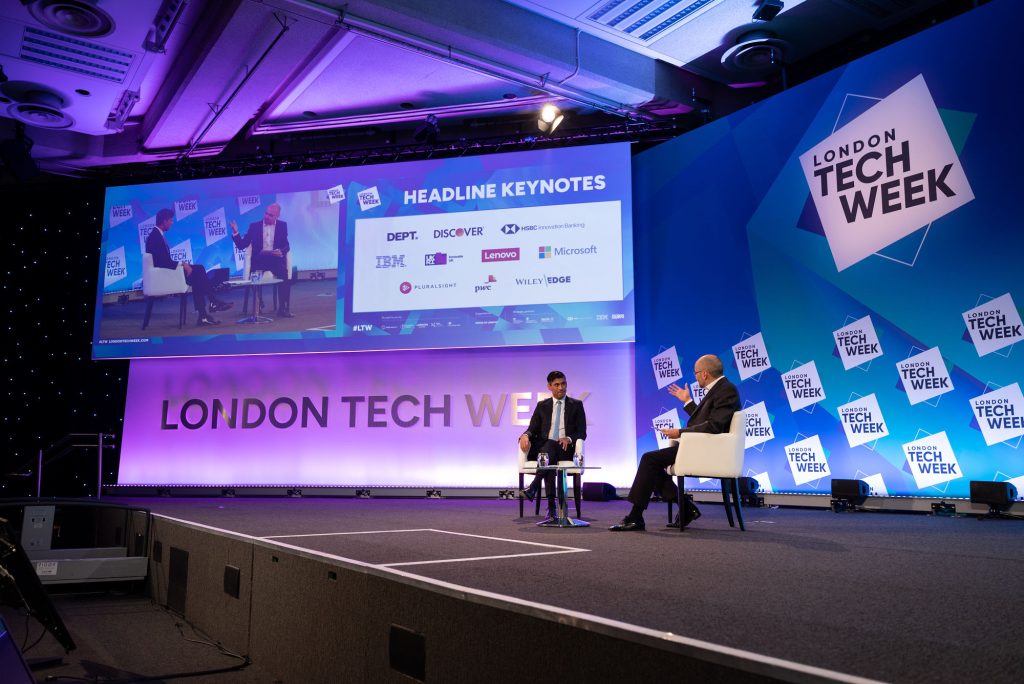
The Unmissable Fireside Chat: “A unique insight into the future of AI from the people leading the charge” – witnessed a captivating conversation between Rishi Sunak, the UK Prime Minister, and Demis Hassabis, the co-founder of Google DeepMind.
The engaging dialogue delved into the transformative power of artificial intelligence (AI) and its implications for the future of technology. Their insightful exchange shed light on the collaborative efforts needed to harness AI’s potential and shape a tech-driven world. Both highlighted the tremendous opportunities that lie ahead and the need for strategic investments and collaboration to seize them.
AI as a catalyst for economic growth
As you’d expect a Prime Minster to, Rishi Sunak expressed his optimism about AI as a driving force behind economic growth and increased productivity. He envisioned AI as a co-pilot, augmenting human capabilities across various sectors and unleashing new waves of innovation. By embracing AI technologies, the UK aims to position itself as a global leader in tech innovation, fostering an environment that attracts top talent and facilitates groundbreaking research and development.
Enhancing public services through AI
Demis Hassabis emphasised the transformative impact of AI on public services, highlighting AI’s potential in healthcare, education, and transportation, among others. From AI-driven medical diagnoses and personalised learning experiences to efficient transportation systems, AI has the capacity to improve the lives of citizens and reshape the way public services are delivered. Demis stressed the importance of collaboration between tech companies, academia, and government entities to unlock AI’s full potential in these domains.
Nurturing a thriving tech ecosystem: Collaboration and regulation
The conversation underscored the significance of fostering a thriving tech ecosystem through collaboration and responsible regulation; both emphasised the importance of striking the right balance between innovation and safeguarding the public interest.
Both leaders stressed the need for collaboration across sectors, nations, and disciplines. Rishi Sunak emphasised the UK’s commitment to forging global partnerships and sharing knowledge to create a genuinely interconnected tech ecosystem. Demis Hassabis echoed this sentiment, highlighting the importance of collaborative efforts to tackle complex challenges and drive technological advancements at an accelerated pace. By fostering collaboration, the UK can leverage the expertise of global partners and establish itself as a hub for innovation.
Responsible regulation: Safeguarding innovation and ethical AI
Demis was keen to acknowledge the importance of responsible regulation in AI development. He emphasised the need for ethical considerations and transparency in AI systems to ensure they align with societal values. Rishi Sunak highlighted the UK’s approach to regulation, which seeks to strike a balance between supporting innovation and implementing necessary safeguards. The discussion revolved around the importance of engaging industry experts and stakeholders to create a regulatory framework that fosters innovation while protecting the rights and well-being of individuals.
I think the only the right way to proceed is with the precautionary principle. You know, proceed with exceptional care, be optimistic about what we can do with the opportunities and, and sort of use things like the scientific method to study and carefully analyse these systems as they get increasingly more powerful in the future.
Demis Hassabis, Co-founder Google Deepmind
Looking ahead: Shaping a tech-driven future
The conversation concluded with a shared vision of a tech-driven future where AI and innovation propel society forward.
Both leaders emphasised that AI should be viewed as an enabler rather than a replacement for human capabilities. They envisioned a future where AI systems work in collaboration with humans, augmenting their abilities and driving progress across various domains. By leveraging AI’s potential, society can unlock new possibilities and solve complex challenges, ultimately improving the human experience.
Summing up
London Tech Week 2023 provided an insightful platform for tech leaders like to discuss the transformative potential of AI. The key themes included the vision of AI as a ‘Co-Pilot’ to enhance human capabilities, the importance of responsible AI regulation, and the UK’s ambition to become a global tech leader. As we stand on the cusp of an AI-driven era, the future is certainly looking bright.
Table of contents
